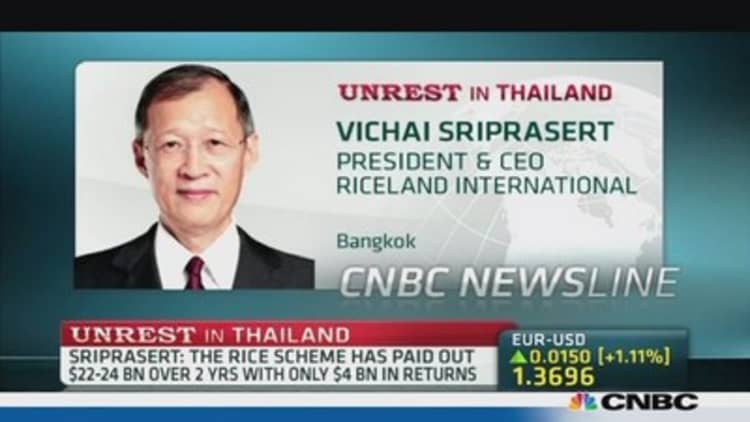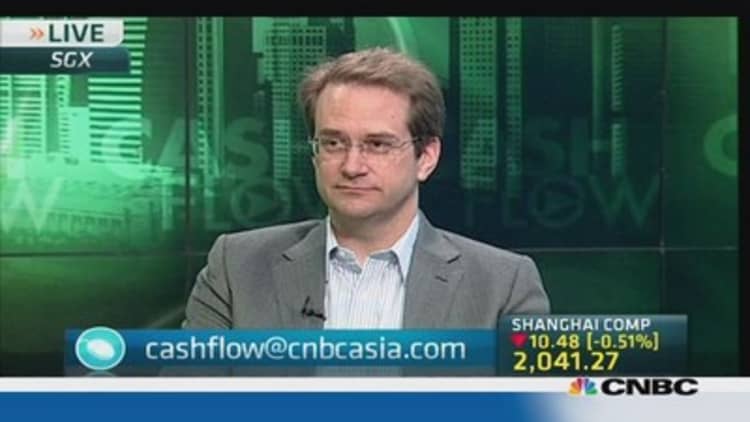
By any measure, Thailand's rice subsidy program has been an expensive boondoggle – and a big driver of the current political unrest – but ending it will bring its own troubles.
"The whole country, the rice industry has suffered a lot. The quantity of exports declined about 35 percent (and) revenue declined by 25 percent" in the program's first year, said Vichai Sriprasert, CEO of Riceland International, one of Thailand's biggest rice exporters.
"We used to be the rice champion of the world in (terms of) rice exports," he told CNBC. "With the program, we lost our championship. We became the third (biggest exporter). Revenue went down, quantity went down."
(Read more: Thai market may muddle through state of emergency)
The program was meant to buy rice from farmers at much higher than market rates, aiming to increase rural incomes to stimulate consumption, but farmers haven't been paid in around four months as funds ran low.
Some farmers, who generally offer a solid base of support for the current government, are falling deeply into debt as they borrow from moneylenders. One of the demands of anti-government protestors currently crippling the capital is to end populist programs such as the rice subsidies, viewing them as vote buying.
The rice subsidy program lost around $4.3 billion on the 2011-2012 crop, the last time losses were reported.
(Read more: Has Thailand's government survived the gauntlet?)
Vichai believes the program has been badly managed, estimating at least a third of the $24 billion in total funding was lost through stealing and corruption and only about a third actually reached farmers. He wants the program to be completely eradicated, saying it has distorted the rice market.
"It's a huge problem," he said, noting the government has around 20 million tons of rice stockpiled, equivalent to around two years of the country's "best exports," with another 10 million tons from the current yearly crop on the way.
The rice program is likely to come to an end, whether or not the current government survives the latest round of political turmoil, Pimpaka Nichgaroon, head of research at Thanachart Securities, said in a note. She noted the program has already nearly come to a halt as it is facing fresh legal limitations and she expects other populist policies will see major cuts.
(Read more: Have the protests hobbled the Bank of Thailand?)

There are solid indications that the populist programs may have helped to alleviate poverty in rural Thailand, with poverty reduced from a peak of around 42.6 percent of the population in 2000 after the Asian Financial Crisis, to around 13.2 percent in 2011, according to the World Bank; most of the poor live in the country's rural areas.
Thanachart estimates the yearly investment in the rice subsidy program at around 3 percent of gross domestic product (GDP). Some analysts put Bangkok's contribution to GDP at around 30 percent, indicating regions receiving the subsidies are significant contributors to the country's economic growth.
"We see disruption to (the subsidies) curbing the purchasing power of upcountry people," which is likely to hurt retail sales, Thanachart said in a note. "Upcountry growth has played a vital role in driving retail industry growth." It downgraded the retail sector to "underweight" from "overweight."
(Read more: Thai unrest casts doubt on investment expansions)
To be sure, not everyone thinks ending the subsidies would hurt retailers much.
"We've only had (the program) for the past two years," Nirgunan Tiruchelvam, an analyst at Standard Chartered, told CNBC. Farmers don't appear to have adjusted their consumption patterns, he said, noting sales growth at specific companies were steady with levels prior to the subsidy's introduction.
He also believes clearing the government's stockpile will lead to increases in rice prices ahead.
In addition, not everyone is convinced that ending the rice subsidies will mean the end of populist measures.
"Obviously, the farmer should be helped. Subsidies should go directly to supplement their income. We call it income support rather than price support. That would not distort the market," said Riceland's Vichai, who noted that he wants to see current government out of power.
—By CNBC.Com's Leslie Shaffer; Follow her on Twitter @LeslieShaffer1

